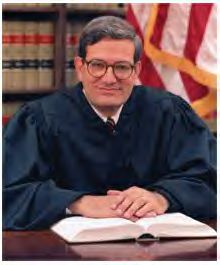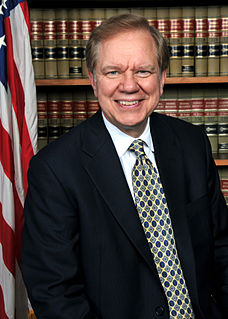United States v. Cruikshank, 92 U.S. 542 (1876), was an important United States Supreme Court case in which the Court held that the Bill of Rights did not apply to private actors or to state governments despite the adoption of the Fourteenth Amendment. It reversed the federal criminal convictions for the civil rights violations committed in aid of anti-Reconstruction murders. Decided during the Reconstruction Era, the case represented a major blow to federal efforts to protect the civil rights of African Americans.
Tinker v. Des Moines Independent Community School District, 393 U.S. 503 (1969), was a landmark decision by the United States Supreme Court that defined First Amendment rights of students in U.S. public schools. The Tinker test, also known as the "substantial disruption" test, is still used by courts today to determine whether a school's interest to prevent disruption infringes upon students' First Amendment rights.
In United States law, the Establishment Clause of the First Amendment to the United States Constitution, together with that Amendment's Free Exercise Clause, form the constitutional right of freedom of religion. The relevant constitutional text is:
Congress shall make no law respecting an establishment of religion, or prohibiting the free exercise thereof...
Bell v. Wolfish, 441 U.S. 520 (1979), is a case in which the United States Supreme Court addressed the constitutionality of various conditions of confinement of inmates held in federal short-term detention facilities. The Court narrowly found that while treatment of pre-trial detainees is subject to constraint by the First, Fifth, and Fourteenth Amendments,[2] all of the policies challenged in the case passed constitutional scrutiny.

José Alberto Cabranes is a United States Circuit Judge of the United States Court of Appeals for the Second Circuit and a former Presiding Judge of the United States Foreign Intelligence Surveillance Court of Review ("FISCR"). Formerly a practicing lawyer, government official, and law teacher, he was the first Puerto Rican appointed to a federal judgeship in the continental United States (1979).
The right to a Free Appropriate Public Education (FAPE) is an educational entitlement of all students in the United States who are identified as having a disability, guaranteed by the Rehabilitation Act of 1973 and the Individuals with Disabilities Education Act (IDEA).
Robert David Sack is a Senior United States Circuit Judge of the United States Court of Appeals for the Second Circuit.

David Brookman Smith, known professionally as D. Brooks Smith, is a Senior United States Circuit Judge of the United States Court of Appeals for the Third Circuit. He was previously Chief Judge of both the United States Court of Appeals for the Third Circuit and the United States District Court for the Western District of Pennsylvania, and is the only judge in the history of the Third Circuit to have served as both a chief district judge and chief of the Court of Appeals. Beginning January 2022, Smith will begin to serve as Penn State Law's new jurist in residence.

Thomas Lee Ambro is a United States Circuit Judge of the United States Court of Appeals for the Third Circuit. He began his judicial service in 2000.
Board of Regents of the University of Wisconsin System v. Southworth, 529 U.S. 217 (2000), is a ruling by the Supreme Court of the United States which held that public universities may subsidize campus groups by means of a mandatory student activity fee without violating the students' First Amendment rights.
Brentwood Academy v. Tennessee Secondary School Athletic Association, 531 U.S. 288 (2001), is a United States Supreme Court case concerning whether the actions of an interscholastic sport-association that regulated sports among Tennessee schools could be regarded as a state actor for First Amendment and Due Process purposes. The Court held that the sport-association can be sued as a state actor because its actions and history have been "entangled" with state action. While the Supreme Court would reconsider this same case in the future, this specific decision became important in articulating a new principle of what entities are bound by the First Amendment.

'Miller v. Skumanick' was a 2010 Third Circuit Court of Appeals case regarding the practice of sexting and its legal relationship to child pornography.

Trinsey v. Pennsylvania, 941 F.2d 224, was a case decided by the United States Court of Appeals for the Third Circuit that confirmed the validity of special elections held without a primary under the Fourteenth and Seventeenth Amendments to the United States Constitution. The case came about due to the death of H. John Heinz III, one of the U.S. senators from Pennsylvania, in a plane crash on April 4, 1991. Under the Seventeenth Amendment, state legislatures may give the Governor the power to appoint officials to fill temporarily vacant Senate seats until a special election can be held, and Pennsylvanian law contained a statute executing this and requiring no primaries for the special election. Instead, both the Democrats and Republicans would each internally select their candidates. John S. Trinsey Jr., a voter and potential candidate, asked the United States District Court for the Eastern District of Pennsylvania to declare the statute unconstitutional as a violation on the Fourteenth and Seventeenth amendments, because the lack of a primary removed his right to properly vote for candidates and delegated that power to political parties.
Soldal v. Cook County, 506 U.S. 56 (1992), was a United States Supreme Court case in which the Court held that a seizure of property like that which occurs during an eviction, even absent a search or an arrest, implicates the Fourth Amendment. The Court also held that the Amendment protects property as well as privacy interests, in both criminal as well as civil contexts. Finally, saying that "certain wrongs affect more than a single right", the Court left open the possibility that the Fourteenth Amendment's protections against deprivation of property without due process of law may also be implicated.

Woollard v. Sheridan, 863 F. Supp. 2d 462, reversed sub. nom., Woollard v Gallagher, 712 F.3d 865, was a civil lawsuit brought on behalf of Raymond Woollard, a resident of the State of Maryland, by the Second Amendment Foundation against Terrence Sheridan, Secretary of the Maryland State Police, and members of the Maryland Handgun Permit Review Board. Plaintiffs allege that the Defendants' refusal to grant a concealed carry permit renewal to Mr. Woollard on the basis that he "...ha[d] not demonstrated a good and substantial reason to wear, carry or transport a handgun as a reasonable precaution against apprehended danger in the State of Maryland" was a violation of Mr. Woollard's rights under the Second and Fourteenth Amendments, and therefore unconstitutional. The trial court found in favor of Mr. Woollard, However, the Fourth Circuit Court of Appeals reversed the trial court and the U.S. Supreme Court declined to review that decision.
People v. Aguilar, 2 N.E.3d 321, was an Illinois Supreme Court case in which the Court held that the Aggravated Unlawful Use of a Weapon (AUUF) statute violated the right to keep and bear arms as guaranteed by the Second Amendment. The Court stated that this was because the statute amounted to a wholesale statutory ban on the exercise of a personal right that was specifically named in and guaranteed by the United States Constitution, as construed by the United States Supreme Court. A conviction for Unlawful Possession of a Firearm (UPF) was proper because the possession of handguns by minors was conduct that fell outside the scope of the Second Amendment's protection.
Mozert v. Hawkins, 827 F.2d 1058, was a notable case involving First Amendment rights of religion in protesting required public school reading for students in Tennessee.
Heffernan v. City of Paterson, 578 U.S. ___ (2016), was a United States Supreme Court case in 2016 concerning the First Amendment rights of public employees. By a 6–2 margin, the Court held that a public employee's constitutional rights might be violated when an employer, believing that the employee was engaging in what would be protected speech, disciplines them because of that belief, even if the employee did not exercise such a constitutional right.





